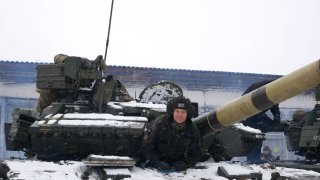The Perils Of Escalation With Russia Are Still Very Real
Russia’s conventional escalation in Ukraine could still intensify in two major ways.
Yet, despite clear evidence of Russia’s resolve, the United States and Europe remain entrenched in outdated assumptions that still underestimate it. To the detriment of their own coercive strategies, Western policymakers consistently fail to recognize, let alone accept, that Russia’s willpower is not driven by imperial ambition but by the conviction that NATO’s deepening relationship with Ukraine—and the endeavor to incorporate it into the alliance—constitutes a threat to its national security. History has repeatedly shown that when a state perceives its security threatened, its resolve hardens.
Today, Russia’s conventional escalation in Ukraine could still intensify in two major ways. First, the range of military targets could expand further. While this has already included Ukraine’s critical infrastructure—such as energy, electricity, and communications—the intensity of attacks could still be ramped up significantly. Likewise, its crosshairs could shift toward Ukraine’s command-and-control and government institutions. Second, Moscow could expand its war aims further. Beyond the four regions annexed in 2022 and Crimea in 2014, Russia could seek to grab more territory, such as Odesa and Kharkiv.
For NATO, the premise of escalation began with the aim to overburden Russia’s invasion, pressuring it to abandon its military objectives and withdraw from Ukraine. Today, escalation aims to coerce Moscow into accepting Western-favored terms for a negotiated settlement.
This strategy—coercive bargaining—is destined to fail on the merits of an inconvenient truth: the West doesn’t hold escalation dominance against Russia. To coerce without advantage is a recipe for diminished coercive power in return.
As such, Donald Trump’s return to the White House provides an opportunity for a course correction in Ukraine. Further escalation, however, must be avoided. To seek to gain or apply leverage is a perilous gamble in this case and will unlikely extract a better deal in the future. Prone to backfire, it’ll force upward pressure on the Kremlin to respond in kind and grant Russia the pretext to flex its conventional muscle even further. As a result, Ukraine’s eroding position on the battlefield—and thus, at the negotiating table—will be accelerated.
For the sake of Ukraine’s people, the practical and moral course is to shift toward a policy of accommodation with Russia, abandoning unproductive attempts to negotiate from an unattainable position of strength. Neither escalation nor time is on Ukraine’s side. The new administration must understand the intransigence of this reality, recognize Russia’s security concerns, and seriously engage with its terms for ending its war on Ukraine.
The pill will surely be a bitter one to swallow now, but its bitterness will only grow with time.
Ramzy Mardini is an associate at the Pearson Institute for the Study and Resolution of Global Conflicts at the University of Chicago. He is also a research affiliate at the Center for International Security & Cooperation at Stanford University.
Image: Seneline / Shutterstock.com.

